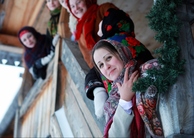|
From Cornell International Affairs Review VOL. 3 NO. 2 Singing in the Wilderness: Kuchi Nomads in Modern Afghanistan
Although the Afghan government nominally recognizes the needs of the kuchi, to date, steps taken have done very little to improve their condition. The Afghan Constitution of 2004 includes provisions that directly address the kuchi. Article 14 of the Constitution obliges the state to implement effective programs for "improving the economic, social and living conditions" of nomads as well as adopting "necessary measures for housing and distribution of public estates to deserving citizens."
Kuchis are also guaranteed the right to vote in any constituency all over the country during presidential elections; despite this, the kuchi reacted somewhat indifferently to the most recent. Though the Constitution affords certain rights for the kuchi, most feel disillusioned over the gap between legal guarantees and their actual accomplishment.27 Only 30 percent of Kuchis have received their identity cards and are thus registered as citizens.28
A blend of new and traditional structures and entities govern the kuchi. The Ministry of Frontiers and Tribal Affairs, Ministry of Agriculture and Animal Husbandry, Ministry of Refugees and Returnees, and the Ministry of Rural Rehabilitation and Development all deal with kuchi issues. However, the Ministry of Frontiers and Tribal Affairs (MFTA) holds the institutional mandate over the kuchi, and in 2006, established the Independent Directorate of Kuchi (IDK). The IDK operates as a representative body of the kuchi, responsible for addressing all relevant social, economic, and political issues.
However, the kuchi tend to minimize their interactions with the state (mostly out of necessity, as they continually cross not only provincial borders but very often national borders) so that in the daytoday life of a kuchi nomad, government authority plays little role.29 In Afghanistan, the shuras--assemblies of leaders that kuchi and other groups used to solve problems and settle disputes--account for more than 80 percent of conflict-based cases settled throughout Afghanistan.
The kuchi have been largely neglected in national plans for economic reconstruction and development because they do not constitute a fixed ethnic or residential group. Consequently, they have had lower levels of access to basic services than the average Afghan. For example, access to education is very limited for the kuchi, although kuchis nationwide have expressed a strong desire for education.30 Today, the kuchi population remains largely illiterate (2 percent of men and 0.05 percent of women are literate whereas the national literacy rate is 12.6 percent for women and 32.4 percent for men), a trend perpetuated by very low school attendance.31
In the 2005 NMAK survey, the kuchi were asked what priorities they would like the Afghan government to address. The five interventions considered most important were access to drinking water, restocking, improved health care, provision of shelter/housing, and increased numbers of educational facilities. The obstacles are severe, and the statistics are stark: only 10 percent of kuchis have access to safe water. 98 percent of kuchis own livestock and on average they own 50 shoats (the estimated minimum number of shoats required for a household to subsist on is 100). Clearly, the current average livestock numbers are too low for a sustained livelihood.
Yet, there remains a widespread preference for pastoralism, as indicated the surprisingly high demand for restocking.32 Access to health care, like education, is limited and constrained by two major factors: the lack of health facilities in the areas where the kuchi are and the lack of trust in these facilities. Likewise, the government is skeptical of the traditional pastoral lifestyle and believe that the kuchis must be settled first before they can be helped.33 Aside from the structural barriers surrounding the settlement of nearly 8.5 percent of the country's population, the preference that many kuchi have for pastoralism suggests that the Afghan government should take a more realistic approach and focus on addressing the nomads' priorities before settlement.
The kuchi are slipping through the cracks. Since 2001, donors, aid agencies, and the Afghan government have disbursed over $15 million in developmental aid, but little has reached the kuchi. According to the IDKA, per capita aid to Afghanistan is estimated at about $60, while the kuchi have only received an estimated 20 US cents per person. There is a clear reason for this—international aid money is usually earmarked through provincial and ministerial budgets, and as there is no kuchi province or ministry, the kuchi have inevitably been left out.
But the broader problem is structural and derived from a narrow view of the contemporary kuchi. Both the Afghan government and the international community have effectively only reached kuchis at the margins—those most desperate and destitute at the IDP camps and those few that are settled and prosperous, a segment covered by national development programs. The many kuchi that practice nomadism are thus stuck in limbo.
Beyond well-intentioned frameworks, the Afghan government must provide concrete solutions that both target the majority of the kuchi and address their priorities. In turn, the kuchi need to come to terms with the reality that they can no longer afford to be distinct from the state. The kuchi must embrace the recently formed institutions and attempts to incorporate them into the broader system as well as learn how to better advocate for themselves. Addressing the kuchi issue is critical, not only on humanitarian grounds, but for Afghanistan's success as a nation. The kuchis are a part of so many key issues facing the country—displacement, the livestock sector, ethnic conflict and land-use disputes, to name a few—that Afghanistan's reconstruction and development will be incomplete until the issue is addressed.
- USAID Afghanistan, “USAID Pilots a Solar Solution for Afghanistan’s Nomads,” USAID 2009
- Richard Tapper, «Who are the Kuchi? Nomad self-identities in Afghanistan,» Journal of the Royal Anthropological Institute 14 (1998): 97
- Frauke de Weijer, “Afghanistan’s kuchi pastoralists: Change and adaptation,” Nomadic Peoples 11 (2007): 11
- Frauke de Weijer, “Afghanistan’s kuchi pastoralists: Change and adaptation,” Nomadic Peoples 11 (2007): 10
- Frauke de Weijer, “Afghanistan’s kuchi pastoralists: Change and adaptation,” Nomadic Peoples 11 (2007): 12
- Bernt Glatzer and Michael Casimir, «Herds and Households among Pashtun Pastoral Nomads,» Ethnology 22 (1983): 310
- Frauke de Weijer, “Afghanistan’s kuchi pastoralists: Change and adaptation,” Nomadic Peoples 11 (2007): 14-15
- Bernt Glatzer and Michael Casimir, «Herds and Households among Pashtun Pastoral Nomads,» Ethnology 22 (1983): 310
- Euan Thomson, «An Overview of the Livestock Sector and Livestock Marketing in Afghanistan,» (presented at the Afghan Livestock Sector Workshop, Kabul Afghanistan, May 17-19, 2008)
- Bahram Tavakolian, «Women and Socioeconomic Change among Sheikhanzai Nomads of Western Afghanistan,» Middle East Journal 38 (1984): 438
- Marc Herold, «War and Modernity: Hard Times for Afghanistan's Kuchi Nomads,» Cursor, http://cursor.org/stories/kuchi.htm.
- Euan Thomson, «An Overview of the Livestock Sector and Livestock Marketing in Afghanistan,» (presented at the Afghan Livestock Sector Workshop, Kabul Afghanistan, May 17-19, 2008)
- Frauke de Weijr, «Towards a Pastoralist Support Strategy,» USAID/RAMP 2005: 2.
- A. Allan Degen and Noam Weisbrod, «Can Pastoral Nomads Return to Their Traditional Livelihood of Raising Livestock in the Registan Desert of Southern Afghanistan,» Nomadic Peoples 8 (2004)
- Frauke de Weijr, «Towards a Pastoralist Support Strategy,» USAID/RAMP 2005: 2.
- Lorene Flaming and Alan Roe, “Opportunities for Pro-Poor Agricultural Growth,” Afghanistan Research and Evaluation Unit (AREU) 2009.
- Liz Alden Wily, “Looking for Peace on the Pastures: Rural Land Relations in Afghanistan,” AREU publication 2004.
- Liz Alden Wily, “Looking for Peace on the Pastures: Rural Land Relations in Afghanistan,” AREU publication 2004
- Frauke de Weijer, “Afghanistan’s kuchi pastoralists: Change and adaptation,” Nomadic Peoples. 11 (2007): 22
- Frauke de Weijer, “National Multisectoral Assessment on Kuchi (NMAK),” Afghanistan Ministry for Rural Rehabilitation and Development 2005
- U.S. Institute for Peace, “Between the Jirga and the Judge: Alternative Dispute Resolutions in Southeastern Afghanistan,” USIP 2009, http://www.usip.org/files/file/jirga_judge.pdf
- Minority Rights Group International, “World Directory of Minorities and Indigenous Peoples – Afghanistan: Kuchis,” 2008, http://www.unhcr.org/refworld/topic,463af2212,47b9986c2,49749d698,0.html
- Internal Displacement Monitoring Centre. “Afghanistan: Increasing hardship and limited support for growing displaced population,” 2008
- Ministry of Rural Rehabilitation and Development, “Project Document for IDP National Plan (AFG/04613),” Afghanistan MRRD, 2004
- A. Allan Degen and Noam Weisbrod, “Can Pastoral Nomads Return to Their Traditional Livelihoods of Raising Livestock in the Registan Desert of Southern Afghanistan?” Nomadic Peoples. 8 (2004): 15
- Internal Displacement Monitoring Centre. “Afghanistan: Increasing hardship and limited support for growing displaced population,” 2008
- Bidhayak Das. “Afghanistan: Upholding democracy through ballots,” ANFREL Foundation 2009
- U.N. Human Rights Council, “Report of the High Commissioner for Human Rights on the situation of human rights in Afghanistan and on the achievements of technical assistance in the field of human rights (A/HRC/10/23),” 16 January 2009, http://unama.unmissions.org/Portals/UNAMA/human%20rights/09march05-Annual-Report-HCHR-%20ENG%205%20MARCH%202009.pdf
- Frauke de Weijer, “Ministry of Frontiers and Tribal Affairs,” Afghan Pastoralists, http://www.afghanpastoralists.com/mfta.htm
- Frauke de Weijer, “Afghanistan’s kuchi pastoralists: Change and adaptation,” Nomadic Peoples. 11 (2007)
- UN Development Program, “Chapter 1: The state of Human Development and the Afghan Millennium Development Goals,” UNDP 2007, http://www.undp.org.af/MDGs/nhdr07_chap1.pdf
- Frauke de Weijer, “National Multisectoral Assessment on Kuchi (NMAK),” Afghanistan Ministry for Rural Rehabilitation and Development 2005
- Thomas J. Barfield, “Nomadic Pastoralists in Afghanistan: Reconstruction of the Pastoral Economy, “ 2004, http://www.bicusa.org/Legacy/Nomadic_Pastoralists_final.pdf
Photos courtesy of:
Endnotes
- USAID Afghanistan, “USAID Pilots a Solar Solution for Afghanistan’s Nomads,” USAID 2009
- Richard Tapper, «Who are the Kuchi? Nomad self-identities in Afghanistan,» Journal of the Royal Anthropological Institute 14 (1998): 97
- Frauke de Weijer, “Afghanistan’s kuchi pastoralists: Change and adaptation,” Nomadic Peoples 11 (2007): 11
- Frauke de Weijer, “Afghanistan’s kuchi pastoralists: Change and adaptation,” Nomadic Peoples 11 (2007): 10
- Frauke de Weijer, “Afghanistan’s kuchi pastoralists: Change and adaptation,” Nomadic Peoples 11 (2007): 12
- Bernt Glatzer and Michael Casimir, «Herds and Households among Pashtun Pastoral Nomads,» Ethnology 22 (1983): 310
- Frauke de Weijer, “Afghanistan’s kuchi pastoralists: Change and adaptation,” Nomadic Peoples 11 (2007): 14-15
- Bernt Glatzer and Michael Casimir, «Herds and Households among Pashtun Pastoral Nomads,» Ethnology 22 (1983): 310
- Euan Thomson, «An Overview of the Livestock Sector and Livestock Marketing in Afghanistan,» (presented at the Afghan Livestock Sector Workshop, Kabul Afghanistan, May 17-19, 2008)
- Bahram Tavakolian, «Women and Socioeconomic Change among Sheikhanzai Nomads of Western Afghanistan,» Middle East Journal 38 (1984): 438
- Marc Herold, «War and Modernity: Hard Times for Afghanistan's Kuchi Nomads,» Cursor, http://cursor.org/stories/kuchi.htm.
- Euan Thomson, «An Overview of the Livestock Sector and Livestock Marketing in Afghanistan,» (presented at the Afghan Livestock Sector Workshop, Kabul Afghanistan, May 17-19, 2008)
- Frauke de Weijr, «Towards a Pastoralist Support Strategy,» USAID/RAMP 2005: 2.
- A. Allan Degen and Noam Weisbrod, «Can Pastoral Nomads Return to Their Traditional Livelihood of Raising Livestock in the Registan Desert of Southern Afghanistan,» Nomadic Peoples 8 (2004)
- Frauke de Weijr, «Towards a Pastoralist Support Strategy,» USAID/RAMP 2005: 2.
- Lorene Flaming and Alan Roe, “Opportunities for Pro-Poor Agricultural Growth,” Afghanistan Research and Evaluation Unit (AREU) 2009.
- Liz Alden Wily, “Looking for Peace on the Pastures: Rural Land Relations in Afghanistan,” AREU publication 2004.
- Liz Alden Wily, “Looking for Peace on the Pastures: Rural Land Relations in Afghanistan,” AREU publication 2004
- Frauke de Weijer, “Afghanistan’s kuchi pastoralists: Change and adaptation,” Nomadic Peoples. 11 (2007): 22
- Frauke de Weijer, “National Multisectoral Assessment on Kuchi (NMAK),” Afghanistan Ministry for Rural Rehabilitation and Development 2005
- U.S. Institute for Peace, “Between the Jirga and the Judge: Alternative Dispute Resolutions in Southeastern Afghanistan,” USIP 2009, http://www.usip.org/files/file/jirga_judge.pdf
- Minority Rights Group International, “World Directory of Minorities and Indigenous Peoples – Afghanistan: Kuchis,” 2008, http://www.unhcr.org/refworld/topic,463af2212,47b9986c2,49749d698,0.html
- Internal Displacement Monitoring Centre. “Afghanistan: Increasing hardship and limited support for growing displaced population,” 2008
- Ministry of Rural Rehabilitation and Development, “Project Document for IDP National Plan (AFG/04613),” Afghanistan MRRD, 2004
- A. Allan Degen and Noam Weisbrod, “Can Pastoral Nomads Return to Their Traditional Livelihoods of Raising Livestock in the Registan Desert of Southern Afghanistan?” Nomadic Peoples. 8 (2004): 15
- Internal Displacement Monitoring Centre. “Afghanistan: Increasing hardship and limited support for growing displaced population,” 2008
- Bidhayak Das. “Afghanistan: Upholding democracy through ballots,” ANFREL Foundation 2009
- U.N. Human Rights Council, “Report of the High Commissioner for Human Rights on the situation of human rights in Afghanistan and on the achievements of technical assistance in the field of human rights (A/HRC/10/23),” 16 January 2009, http://unama.unmissions.org/Portals/UNAMA/human%20rights/09march05-Annual-Report-HCHR-%20ENG%205%20MARCH%202009.pdf
- Frauke de Weijer, “Ministry of Frontiers and Tribal Affairs,” Afghan Pastoralists, http://www.afghanpastoralists.com/mfta.htm
- Frauke de Weijer, “Afghanistan’s kuchi pastoralists: Change and adaptation,” Nomadic Peoples. 11 (2007)
- UN Development Program, “Chapter 1: The state of Human Development and the Afghan Millennium Development Goals,” UNDP 2007, http://www.undp.org.af/MDGs/nhdr07_chap1.pdf
- Frauke de Weijer, “National Multisectoral Assessment on Kuchi (NMAK),” Afghanistan Ministry for Rural Rehabilitation and Development 2005
- Thomas J. Barfield, “Nomadic Pastoralists in Afghanistan: Reconstruction of the Pastoral Economy, “ 2004, http://www.bicusa.org/Legacy/Nomadic_Pastoralists_final.pdf
Photos courtesy of:
Save Citation » (Works with EndNote, ProCite, & Reference Manager)
APA 6th
Ker, M., & Locke, J. (2010). "Singing in the Wilderness: Kuchi Nomads in Modern Afghanistan." Cornell International Affairs Review, 3(2). Retrieved from http://www.inquiriesjournal.com/a?id=1260
MLA
Ker, Michelle , and Jacob Locke. "Singing in the Wilderness: Kuchi Nomads in Modern Afghanistan." Cornell International Affairs Review 3.2 (2010). <http://www.inquiriesjournal.com/a?id=1260>
Chicago 16th
Ker, Michelle , and Jacob Locke. 2010. Singing in the Wilderness: Kuchi Nomads in Modern Afghanistan. Cornell International Affairs Review 3 (2), http://www.inquiriesjournal.com/a?id=1260
Harvard
KER, M., & LOCKE, J. 2010. Singing in the Wilderness: Kuchi Nomads in Modern Afghanistan. Cornell International Affairs Review [Online], 3. Available: http://www.inquiriesjournal.com/a?id=1260
Suggested Reading from Inquiries Journal
At present, ‘more than 80 percent of Afghan women are illiterate’.1 However, in the rural regions of Afghanistan, where more than 74 percent of the population lives, the illiteracy rate of females is closer to... MORE»
British troops will be winding up their operations in Afghanistan by the end of next year. There may be other specialised things British troops will do thereafter, depending on what happens in Afghanistan from 2015. But sustained ‘combat operations’ for British forces have already ended and the 9,000 British troops in... MORE»
On the 60th anniversary of the North Atlantic Treaty Organization's founding, Afghanistan provides a unique opportunity for the alliance to prove its strength beyond Europe and combat global security threats from terrorism and instability.2 But despite proving its early critics such as John Mearsheimer wrong during the 1990s, NATO... MORE»
Nearly eight years into the war, the security situation in Afghanistan appears to be deteriorating at an increasingly fast past. Areas that were previously secured have been retaken by militants; significant increases in civilian casualties, caused primarily by U.S.-led attacks, have fostered a growing resentment within the civilian... MORE»
Latest in Anthropology
2021, Vol. 13 No. 04
While the history of ethnography in Russia dates back to the Kievan Rus era, modern ethnographic production in Russia developed in the 17th century and expanded during the late 18th and early 19th centuries as interest in folktales and in the lives... Read Article »
2020, Vol. 12 No. 11
This paper explores the spatial expression of the female gender in early Mesopotamian cities from c. 2334-1595 B.C.E. Gender in Mesopotamia has been widely studied socially but not spatially, and here I aim to provide a consideration of gender through... Read Article »
2020, Vol. 12 No. 11
Many natural history museums use the categories of “cultural” and “natural” as a means of separating exhibition content. This article challenges this practice and the inherent paradigm that supports it. By dismissing the... Read Article »
2020, Vol. 12 No. 09
Since the European invasion of Latin America in the sixteenth century, the concept of indigeneity has been inherently political. In what can only be described as an ongoing ethnocide, colonial powers did everything they could to stomp out the rich... Read Article »
2020, Vol. 12 No. 02
On November 20th, 2018, a federal judge in Michigan ruled that the Female Genital Mutilation Act 1996, which federally prohibits female genital mutilation (FGM/C) in the United States, was unconstitutional within the context of a case that has presented... Read Article »
2019, Vol. 11 No. 02
The issue of “comfort women,” sex slaves utilized by the Japanese army during World War II, is treated in this paper as a collective memory in the consciousness of South Koreans. Differing narratives of this historical event, and the... Read Article »
2018, Vol. 10 No. 12
The study of DNA and genetics has always been a large mystery to many scientists. The current Ancient DNA (aDNA) research on human history is more complex than what can be inferred from modern DNA research. Scientists and researchers are constantly... Read Article »
|




















